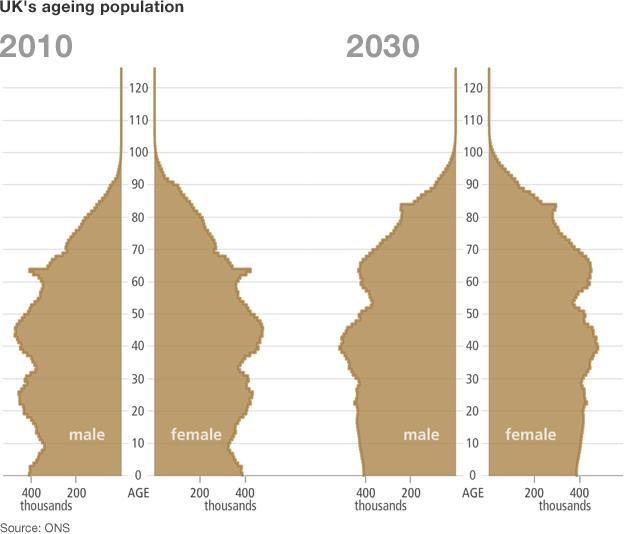UK woefully underprepared for ageing society, say peers
- Published
- comments

The East Midlands is forecast to see the biggest increase in over-65s by 2030
The UK is "woefully underprepared" for the social and economic challenges presented by an ageing society, a Lords committee has warned.
The committee said "the gift of longer life" could lead to "a series of crises" in public service provision.
Peers said big changes in pensions, health care and employment practices were needed to help people "sustain a good quality of life" as they aged.
The government said supporting people in later life was a priority.
'Honest debate'
The Lords committee on public service and demographic change cited figures from the Office for National Statistics that forecast a 50% rise in the number of over-65s and a doubling in over-85s between 2010 and 2030.
The committee has been looking into the impact of demographic change on the UK for nearly a year and has questioned a number of government figures, including Health Secretary Jeremy Hunt, as well as academics, charities and companies such as Alliance Boots and B&Q.
Publishing its findings, the committee said the fact people were living longer offered benefits for many but also threatened a "series of crises" unless action was taken to mitigate the impact on public services.
With the number of people living with long-term medical conditions set to rise sharply, a "radically different model" of care would be needed to support people in their homes and to prevent pressure on the NHS, it said.
The committee is calling on the government to set out its thinking on the issue before the next election and for all parties to consider the implications for public spending, in their next election manifestos.
Labour's Lord Filkin: ''The government should set out a White Paper about what these issues are''
Whoever was in power after the next election, the committee said, should establish independent commissions to examine how pension and savings provisions could be increased, how equity release could be better exploited and how funding for social care could be improved.
"As a country we are not ready for the rapid ageing of our population," Lord Filkin, the Labour peer who chairs the committee, said.
"The amazing gift of longer life is to be welcomed, but our society and politicians need to address the implications and the changes needed to attitude, policies and services so people are best able to benefit from it."
He warned these challenges were not a "distant issue".
"Our population is older now and will get more so over the next decade. The public are entitled to an honest conversation about the implications," he said.
A leading think tank said the report should be a wake-up call for government and society as a whole and that individuals would have to take more responsibility for their health and income in retirement.
"Our society is in denial of the inevitability of ageing," said Baroness Greengross, chief executive of the International Longevity Centre UK and a crossbench member of the House of Lords. "We have put off the difficult decisions for far too long."
"The report paints a picture of a health and care system which doesn't work for today's older population. Similarly our communities, housing and transport systems are ill-equipped for the challenges ahead."
Policymakers should not be afraid to tell people they will need to work longer and that state pension ages may need to increase further as healthy life expectancy changes, she added.
'More sustainable'
The Department of Health said supporting people in later life was a priority for the government.
"That is why we took the decision to invest £7.2 billion over four years to protect access to care and support and for the first time ever are bringing in a cap on care fees to make old age care costs more sustainable," a spokesman said.
"However, we cannot improve care and support by putting ever more money into the system. Many local authorities are innovating and achieving much greater integration between health and care services, thereby improving care for people and optimising use of resources available."
For Labour, Liz Kendall said: "This excellent report rightly emphasises the huge contribution older people already make to the economy and in their communities, and that more should be done to ensure older people can play an even fuller role in future.
"I particularly welcome the committee's call for radical reform of the NHS and social care. We need far bolder changes to ensure these services are fully integrated, with a much bigger focus on prevention to help people stay healthy and living independently for longer."

- Published14 March 2013
- Published9 February 2013
- Published9 March 2013
- Published7 December 2010
- Published24 October 2012